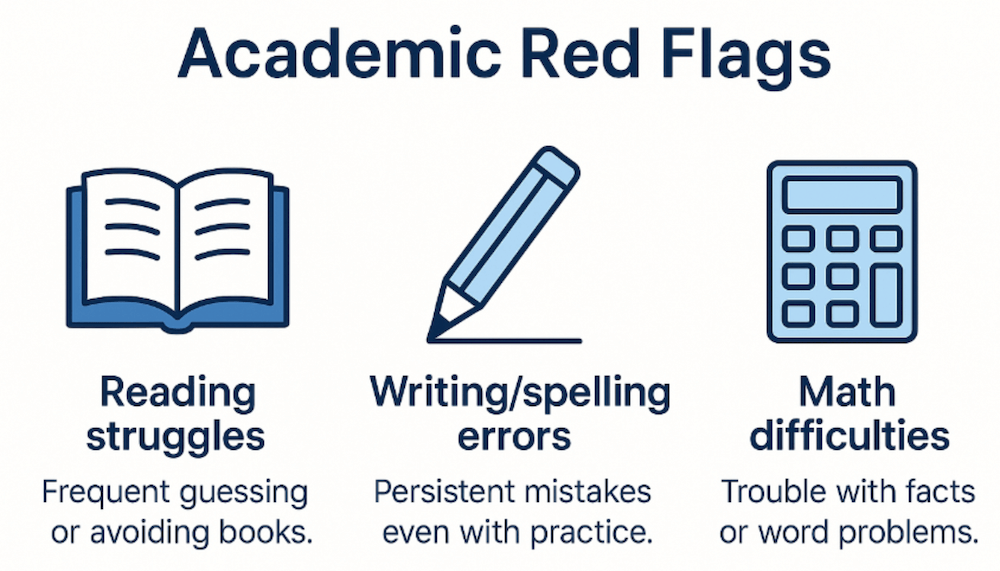Signs Your Child May Need a Psycho-Educational Evaluation
✏️ Introduction
Every parent wants their child to thrive in school and feel confident in their abilities. But sometimes, challenges in reading, attention, memory, or behavior create frustration for both children and families. You may be wondering: Are these normal struggles, or a sign that something deeper is happening?
A psycho-educational evaluation can provide clarity. These comprehensive assessments uncover the root of a child’s learning, attention, or emotional difficulties and point the way toward targeted support. Below are the most common signs that it may be time to seek an evaluation—and why acting early matters.
📚 Academic Red Flags
Some school work struggles are typical, but persistent patterns may indicate a learning difference. Parents should take note if challenges continue despite good instruction and effort:
Difficulty learning to read – frequent guessing, trouble sounding out words, or avoiding books altogether.
Slow or inaccurate writing and spelling – many errors even with practice, or difficulty remembering how to form letters and words.
Math struggles – trouble memorizing math facts, solving word problems, or grasping basic number sense.
Homework battles – assignments that should take 20 minutes stretch into hours, with frustration for both child and parent.
🔎 Why it matters: Ongoing academic struggles often point to a learning disability such as dyslexia, dysgraphia, or dyscalculia. A psycho-educational evaluation identifies these patterns and helps schools and families provide appropriate supports.
🧠 Attention & Behavior Concerns
Not every child who is active or easily distracted has ADHD. Still, persistent attention difficulties can interfere with learning and daily functioning:
Easily distracted or forgetful – misplaces materials, forgets instructions, or struggles to stay on task.
Difficulty sitting still – frequent fidgeting, leaving the seat, or excessive talking.
Incomplete or rushed work – starting assignments but leaving them unfinished, or working too quickly and making avoidable errors.
Teacher feedback – recurring notes home about focus, effort, or classroom behavior.
⚖️ Why it matters: Attention challenges may stem from ADHD, anxiety, sleep issues, or executive functioning weaknesses. An evaluation can clarify what’s going on so families know whether to pursue classroom accommodations, behavioral strategies, or further medical consultation.
💬 Social & Emotional Indicators
Academic struggles often spill over into social and emotional well-being. Warning signs that go beyond “typical” ups and downs include:
Frequent frustration or meltdowns when schoolwork feels overwhelming.
Low confidence or negative self-talk (“I’m stupid” or “I’ll never get this right”).
Peer difficulties – trouble making friends, keeping friends, or navigating social cues.
School-related physical complaints – headaches, stomachaches, or frequent nurse visits on test or school days.
💡 Why it matters: Emotional stress can mask as behavior problems, and social difficulties may stem from learning or attention differences. Early assessment gives families tools to reduce frustration and rebuild confidence.
⏰ When to Take Action
Parents often hope children will “grow out of” challenges, but untreated difficulties usually widen over time. By middle or high school, small gaps can snowball into serious barriers. Seeking help early means:
Identifying strengths and weaknesses clearly – so parents and teachers know how to build on what’s working.
Accessing school supports and accommodations – such as extra time, small-group instruction, or specialized reading interventions.
Protecting self-esteem – children who understand their learning profile are less likely to blame themselves.
Reducing long-term frustration – targeted strategies prevent unnecessary years of struggle.
📌 Key takeaway: Acting early is not about labeling a child—it’s about empowering them with clarity and support.
🌟 Conclusion
If several of these signs sound familiar, your child may benefit from a psycho-educational evaluation. These assessments provide clarity, identify barriers, and create a roadmap for your child’s success at school and home.
👉 At Luminous Evaluations, we specialize in comprehensive evaluations that help families understand and support their child’s unique learning profile. Contact us today to schedule an evaluation and take the first step toward clarity and confidence.
About the Author
Austin Jones, a licensed Psycho-Educational Specialist and School Psychologist, specializes in private evaluations for children and adolescents. With experience in both school systems and private practice, he helps families understand learning profiles and secure the supports children need to thrive.




